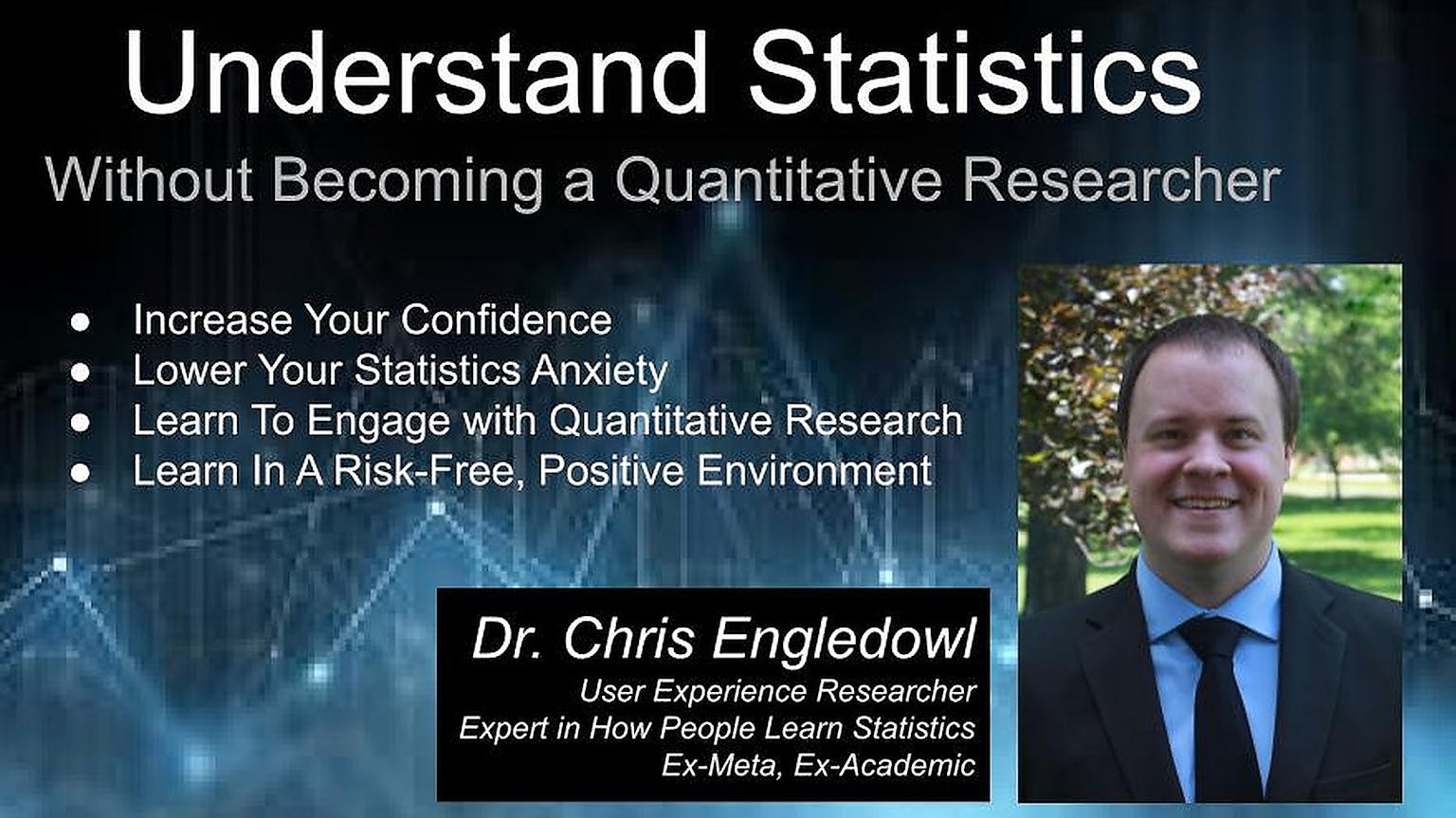Quantitative Research For Qualitative Researchers
3 Weeks
·Cohort-based Course
Five live sessions to avoid the eye glaze effect: Consume statistical reports, engage with stakeholders, and have more impact on your team.
Quantitative Research For Qualitative Researchers
3 Weeks
·Cohort-based Course
Five live sessions to avoid the eye glaze effect: Consume statistical reports, engage with stakeholders, and have more impact on your team.
Course overview
Reduce anxiety, increase confidence, engage with co-workers, and increase impact
+ Gain confidence in conceptually understanding common statistics used in UXR contexts (e.g., mean, standard deviation, distribution, p-value, confidence interval, effect size)
+ Gain confidence in when common statistical tests should be used and for what purpose (e.g., t-test/ANOVA, regression)
+ Learn to critique quantitative research plans and reports
+ Learn to ask meaningful questions about quantitative research plans and reports
+ Learn to offer constructive feedback about quantitative research plans and reports
In aiming for these learning targets, you will learn how to use a framework to support you in knowing what to look for (and what you can skip over), how to ask questions, and in the process lower your anxiety and increase your confidence to more meaningfully engage with your co-workers and stakeholders.
As an added bonus, you might just find yourself enjoying statistics for the first time in your life. If not, I'm totally okay with that - but never say never!
This course is for professional researchers who are not looking to gain advanced statistical knowledge
01
This course is for you if your goal is to confidently consume quantitative research.
02
This course is for you if your goal is to lower your statistics anxiety enough to engage with quant researchers.
03
This course is for you if you want to build community with others who seek to upskill their stats literacy without knowing advanced stats.
What you’ll get out of this course
You will be able to conceptually understand some basic statistics
You will explore the meaning behind some basic statistics to support understanding of more complex statistics without needing to deeply understand the more complex statistics, such as:
a) mean/median, standard deviation, distribution
b) p-value, confidence interval
c) effect size
You will be able to critically consume quantitative research plans and reports
You will gain some proficiency with:
a) reading and digesting quantitative research plans and reports
b) asking meaningful questions about quantitative research plans and reports
c) offering quality suggestions for improving quantitative research plans, results, or impact
You will be able to have confidence engaging with quantitative research
In addition to gaining a robust understanding of important statistical ideas, you will use a framework developed for this course to help you:
a) distinguish which types of analysis are appropriate when
b) what kinds of questions to ask
c) what types of revisions to suggest
You will experience lower anxiety about statistics and quantitative research
You will interact with others who also have anxiety/lack confidence, in a collaborative and highly encouraging and uplifting learning environment. When you fail, we will celebrate it together and learn from it. When you succeed, we will celebrate it together and learn from it.
What people say about me and my courses
Anneke Buffone
Germain Degardin
Anonymous
Anonymous
Anonymous
Anonymous
Anonymous
Anonymous
Meet Chris
Chris Engledowl
Chris Engledowl
UXR, Research Scientist, PhD in Math/Statistics Education, 10+ years teaching experience (high school, undergrad, grad), former-Meta,
Chris is a senior UXR who has experience working as a quantitative UXR at Meta, has expert knowledge of quantitative research methods and how/when to use them (and has published nearly 20 journal and book chapter research studies in top-tier venues). Skills include such topics as ANOVA/MANOVA, regression, hierarchical linear modeling, rasch analysis, factor analysis, latent class analysis, k-means clustering, and discriminatory analysis. Software and language experience includes SPSS, SPSS Amos, MPlus, HLM8, R/RStudio, Jupyter Notebooks, SQL.
More importantly, he has 9+ years actually studying how people think about, make sense of, teach, and learn math and statistics, and has published multiple journal articles for both research and teacher audiences in top-tier venues, drawing on qualitative and quantitative methods to deeply understand peoples' thinking and reasoning processes.
He brings this wealth of expertise to the courses he teaches in order to meet you where you are, in all you differing ways of thinking, including both helpful and limiting conceptions you may have unintentionally picked up over the years.
Be the first to know about upcoming cohorts
Quantitative Research For Qualitative Researchers
Course schedule
2-3 hours per week
Wednesdays
1:10pm - 1:55pm CST
March 1
March 8
Thursdays
5:00pm - 6:00pm CST
February 23
March 2
March 9
Weekly projects
1-2 hours per week
Learning is better with cohorts
Active hands-on learning
This course builds on live workshops and hands-on projects
Interactive and project-based
You’ll be interacting with other learners through breakout rooms and project teams
Learn with a cohort of peers
Join a community of like-minded people who want to learn and grow alongside you
Frequently Asked Questions
Be the first to know about upcoming cohorts
